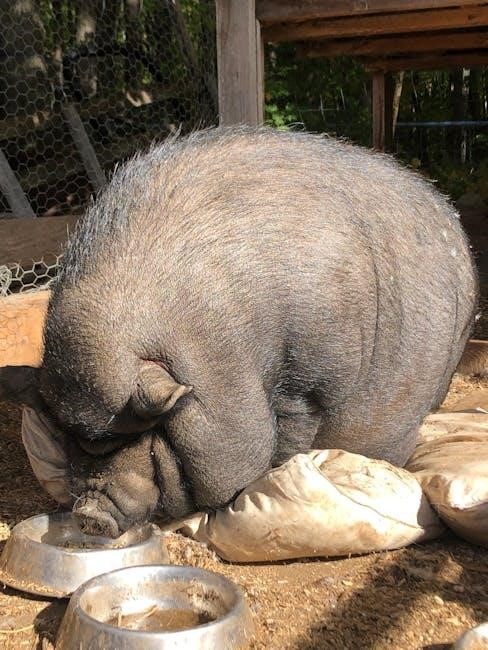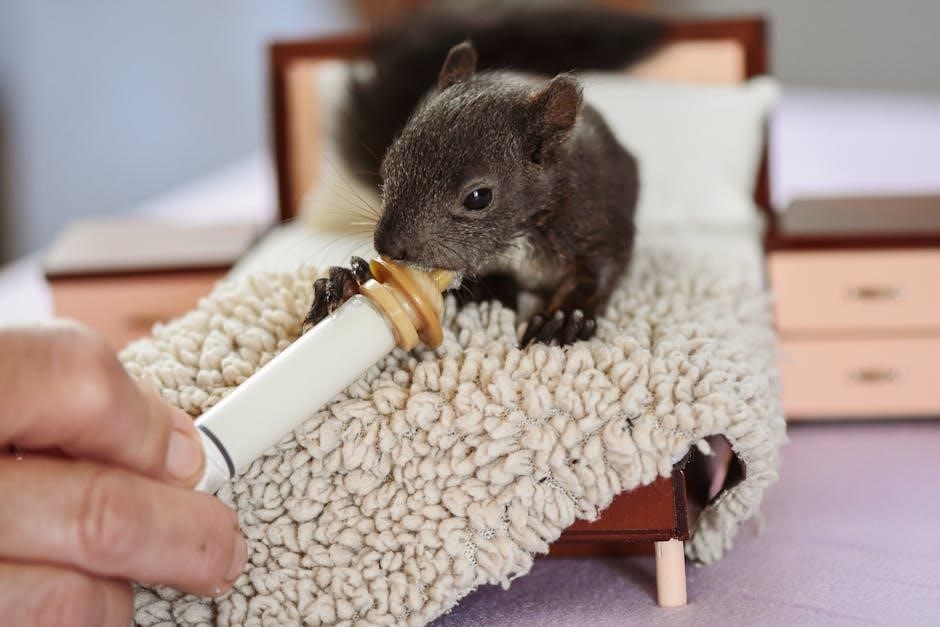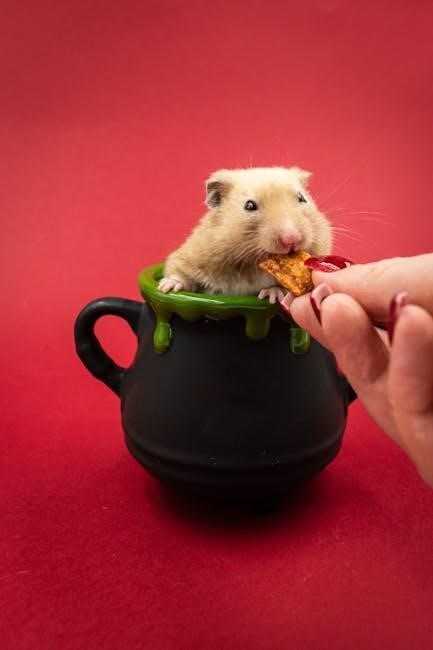A well-balanced diet is crucial for Miniature Dachshunds to maintain their energetic and playful nature. Proper nutrition supports their long, narrow frames and prevents obesity. This guide helps ensure they thrive with tailored feeding strategies.

Overview of the Miniature Dachshund Breed
The Miniature Dachshund is a small, energetic breed known for its playful and affectionate nature. Weighing around 11 pounds when fully grown, they are a compact version of the standard Dachshund, with a long, narrow body and short legs. Originally bred for hunting, they are intelligent and courageous, making them wonderful companions. Their friendly and adaptable temperament makes them a popular choice for families and city dwellers alike. Despite their small size, Miniature Dachshunds have big personalities and require care tailored to their unique needs. Proper feeding is essential to support their energy levels and prevent obesity, a common issue in the breed. Understanding their dietary requirements is vital to ensuring they lead a healthy, active life. This guide is designed to provide insights into their nutritional needs, helping owners make informed decisions for their Miniature Dachshund’s well-being.

Importance of Proper Nutrition for Miniature Dachshunds
Proper nutrition is vital for Miniature Dachshunds to maintain their health and energy levels. Their small size and unique body structure require a balanced diet to prevent common issues like obesity and back problems. Feeding the right amount and type of food ensures they stay active and avoids weight-related health risks. Miniature Dachshunds are prone to overeating, so portion control is essential. A high-quality diet rich in protein, moderate in fat, and low in carbohydrates helps support their metabolism and muscular structure. Additionally, proper nutrition plays a role in maintaining their coat health and preventing digestive issues. Consulting a veterinarian to create a personalized feeding plan is crucial, as their needs vary with age, weight, and activity level. A well-fed Miniature Dachshund is more likely to live a long, happy, and healthy life, free from preventable health complications.

Essential Nutritional Needs for Miniature Dachshunds
Miniature Dachshunds require a diet rich in high-quality protein, moderate fat, and limited carbohydrates. Essential nutrients include vitamins, minerals, and fiber to support their energy needs and overall health, ensuring optimal bodily functions and longevity.
Protein Requirements for Miniature Dachshunds
Miniature Dachshunds require a diet rich in high-quality protein to maintain muscle strength and energy levels. Protein should come from animal-based sources like chicken, beef, fish, or lamb. A minimum of 22-25% protein on a dry matter basis is recommended for adults, while puppies may need slightly higher amounts to support growth. Protein is essential for tissue repair, immune function, and overall vitality. Low-quality or plant-based proteins can lead to nutritional deficiencies, so it’s crucial to choose a dog food with whole meats as the primary ingredient. Avoid fillers and by-products, as they provide little nutritional value. Ensuring adequate protein intake helps prevent health issues and supports their active, playful lifestyle. Always consult a veterinarian to determine the best protein levels for your Miniature Dachshund based on age, weight, and activity level.
Role of Fats, Carbohydrates, and Fiber in Their Diet

Fats, carbohydrates, and fiber play vital roles in the diet of Miniature Dachshunds, supporting their energy needs and digestive health. Fats, particularly from sources like chicken fat or flaxseed, provide essential fatty acids for skin and coat health, while also aiding in the absorption of vitamins. Carbohydrates, such as whole grains or sweet potatoes, offer sustained energy and fiber, which promotes a healthy digestive system. A balanced intake of these nutrients helps prevent issues like obesity and digestive upset. Moderation is key, as overconsumption of fats can lead to weight gain, while excessive fiber may cause gastrointestinal discomfort. Ensuring the right proportion of these elements in their meals supports overall wellness and maintains their lively, energetic nature. Always select dog foods with named fat sources and whole, easily digestible carbohydrates to meet their dietary needs effectively.
Vitamins and Minerals for Optimal Health
Vitamins and minerals are essential for maintaining the overall health of Miniature Dachshunds. They support immune function, bone health, and energy metabolism. Key vitamins include Vitamin A for vision and immune health, Vitamin D for bone development, and Vitamin E for skin health. B vitamins, such as B12, are crucial for energy production and nerve function. Minerals like calcium and phosphorus are vital for their long, narrow frames, while trace minerals like zinc and iron support immune function and prevent deficiencies. A balanced diet ensures these nutrients are provided in the right proportions. Over-supplementation can be harmful, so it’s important to rely on high-quality, nutrient-rich dog food rather than adding supplements without veterinary advice. Proper levels of these nutrients help prevent health issues and keep your Miniature Dachshund thriving throughout their life.
Feeding Miniature Dachshunds by Life Stage
Miniature Dachshunds have varying dietary needs across life stages. Puppies require frequent, nutrient-rich meals for growth, while adults need balanced portions to maintain weight. Seniors may need calorie reductions and easier-to-digest foods.

Feeding Miniature Dachshund Puppies
Feeding Miniature Dachshund puppies requires careful attention to ensure proper growth and development. Puppies typically need 4 meals a day at 2-4 months, reducing to 3 meals at 4-6 months, and 2-3 meals from 6-8 months. Start with small portions of high-quality puppy food rich in protein, such as chicken or beef, to support muscle growth. A 2-month-old puppy may need 2-2.5 ounces per meal, divided into 4 meals daily. As they grow, gradually increase portion sizes but avoid overfeeding to prevent obesity. Introduce wet food cautiously to avoid digestive issues. Transition to adult food around 8-12 months. Always consult a vet for personalized advice, as needs vary based on weight and activity. A balanced diet with essential vitamins and minerals is crucial for healthy bone development and energy levels. Overfeeding can lead to weight issues, so monitor intake closely. Proper nutrition during puppyhood sets the foundation for a healthy, active life.

Feeding Adult Miniature Dachshunds
Adult Miniature Dachshunds require a balanced diet tailored to their energy levels and weight. Feed high-quality adult dog food with animal-based protein sources like chicken, beef, or turkey. Aim for 1/4 to 1/3 cup of dry food per meal, split into two servings daily. Adding a small amount of wet food can enhance flavor and moisture. Monitor their weight closely, as overfeeding can lead to obesity; Active adults may need slightly more food, while less active dogs require portion control. Divide meals to prevent gobbling and maintain metabolic health. Avoid fillers and ensure the diet is rich in essential vitamins and minerals. Fresh water should always be available. Consult a vet annually to adjust portions based on health and activity. Proper feeding supports their long, narrow frames and prevents health issues like back problems or obesity.
Feeding Senior Miniature Dachshunds
As Miniature Dachshunds age, their dietary needs shift to support joint health and weight management. Senior dogs typically require fewer calories but more emphasis on quality nutrients. Feed a high-quality senior dog food formulated for small breeds, focusing on ingredients like glucosamine and chondroitin to support joint health. Protein sources should remain high, but fat content can be reduced to prevent obesity. Divide meals into two portions to aid digestion and prevent overeating. Wet food can be added for moisture, especially if dental issues arise. Monitor their weight and adjust portions to maintain a healthy frame. Consult a vet to tailor the diet based on individual needs, such as managing arthritis or digestive issues. Avoid over-supplementation and ensure fresh water is always available. A balanced senior diet helps maintain energy levels and overall well-being, ensuring your Miniature Dachshund enjoys a healthy, active golden age.

Types of Food for Miniature Dachshunds
Miniature Dachshunds can thrive on dry kibble, wet food, or a mix of both, with some owners opting for raw or homemade diets. Choose high-quality options tailored to their life stage and health needs.

Dry Food (Kibble) for Miniature Dachshunds
Dry food, or kibble, is a popular choice for Miniature Dachshunds due to its convenience and long shelf life. High-quality dry food provides essential nutrients, supporting their energetic and playful nature. It’s important to choose a formula rich in animal-based protein like chicken, beef, or turkey, and avoid fillers that offer little nutritional value. Feeding guidelines suggest 170g of dry food per day, divided into one or two meals, depending on activity levels and age. Puppies may require more frequent, smaller portions, while seniors might need fewer calories to prevent obesity. Always follow the manufacturer’s recommendations and consult a vet to ensure the food meets your Dachshund’s specific needs. Proper portion control is key, as Miniature Dachshunds can easily gain weight. A balanced dry food diet helps maintain their unique physique and overall health.
Wet Food for Miniature Dachshunds
Wet food is a nutritious and flavorful option for Miniature Dachshunds, offering high moisture content which can aid digestion and hydration. It’s often recommended for dogs with urinary issues or picky eaters. Wet food typically contains higher protein levels and fewer carbohydrates compared to dry kibble, making it a great choice for maintaining muscle tone. Portion sizes vary, but guidelines suggest around 540g per day, divided into one or two meals. Mixing wet food with kibble can provide variety and prevent boredom. However, wet food is more perishable and may be more expensive than dry alternatives. When selecting wet food, ensure it’s rich in whole meats and free from unnecessary fillers. Always consult a vet to determine the best balance for your Miniature Dachshund’s dietary needs, especially if transitioning from dry food or managing health conditions. Wet food can be a valuable addition to a well-rounded feeding plan.
Raw and Homemade Diets for Miniature Dachshunds
Raw and homemade diets for Miniature Dachshunds can offer tailored nutrition, but they require careful planning to ensure balance. Many owners opt for raw diets to avoid processed ingredients, believing it mirrors a natural diet. Protein sources like chicken, beef, and fish are staples, often combined with vegetables and supplements. However, consulting a veterinarian is crucial to avoid nutritional deficiencies. Homemade diets allow customization for individual needs, such as weight management or allergies. Some owners add calcium and fish oil for bone and skin health. It’s important to avoid harmful foods like onions, grapes, and chocolate. Ensuring a balanced ratio of protein, fat, and carbohydrates is vital. While raw diets can be beneficial, they also carry risks like bacterial contamination, so proper handling is essential. With dedication and expert guidance, raw and homemade diets can be a healthy, satisfying choice for Miniature Dachshunds.